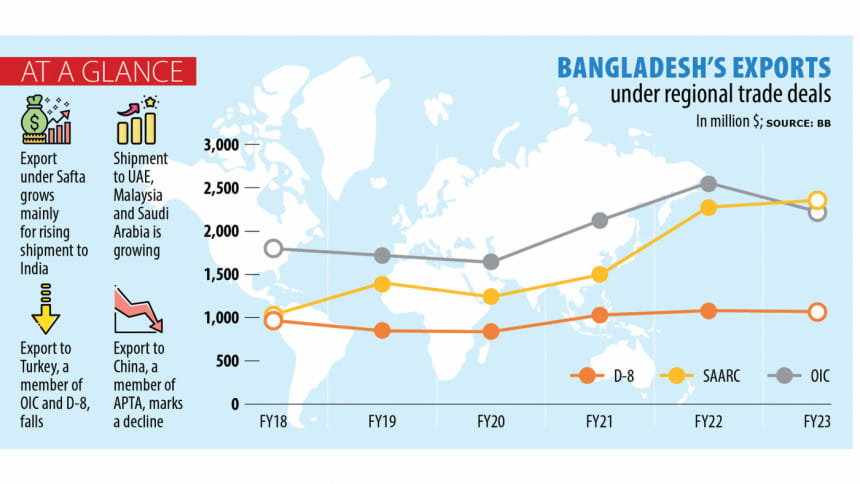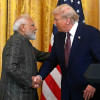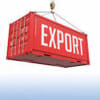Export gains limited from existing trade deals

Bangladesh has so far signed five bilateral and regional trading agreements to bolster exports, trade and investments with a view to expediting economic growth.
However, except for the South Asian Free Trade Area (Safta), the export growth to the countries covered by various trading deals has not been buoyant.
India is the major country where Bangladesh has managed to boost its shipment over the years thanks to the duty-free benefit provided by New Delhi to least-developed countries (LDCs) except for 25 products under the Safta, data from the Export Promotion Bureau (EPB) showed.
Bangladesh's exports to Saarc countries under the Safta doubled to $2.36 billion in the fiscal year of 2022-23 from $1.04 billion five years ago.
On the other hand, exports to the 57-member Organisation of Islamic Cooperation (OIC) under the Trade Preferential System grew 24 percent to $2.23 billion in the five years to FY23.
In the case of D-8, an organisation comprising eight Muslim-majority developing nations, Bangladesh's export rose 11 percent to $1.07 billion since 2017-18.
Mostafa Abid Khan, a former member of the Bangladesh Trade and Tariff Commission, said one of the reasons behind the slow growth of export to the countries under the D-8 PTA has been the limited coverage of products and low preferential margins with limited tradable products of Bangladesh.
The number of items that qualify for concessional tariffs under the OIC TPS is also small, he said.
Bangladesh enjoys duty-free market access for most of its products in India, China and South Korea.
"As Bangladesh is set to graduate from the LDC group, we need to change our approach to getting market access without reciprocity. Rather, we need to give concessions to other countries to ink trade and investment agreements with them as well as blocs such as Regional Comprehensive Economic Partnership," said Khan.
Khondaker Golam Moazzem, research director of the Centre for Policy Dialogue, said the role of the regional trading agreements signed by Bangladesh is insignificant.
"The country is mainly benefiting as an LDC."
The government is in talks to sign a Comprehensive Economic Partnership Agreement with India and Japan.
Moazzem thinks it is vital for Bangladesh to start negotiations as soon as possible as the country will not get duty-free benefits in the Safta and Apta member countries after the LDC graduation in 2026.
Selim Raihan, executive director of the South Asian Network on Economic Modeling, said the progress aimed at inking trade deals has been sluggish so far although it takes several years to complete negotiations.
"Bangladesh is yet to start negotiations. It appears that we have not taken the issue of free trade agreement seriously," he said, adding that Bangladesh also needs to open its market for others to strike trade pacts.
"We need to come out of the LDC mentality of receiving tariff benefits only."
AHM Ahsan, vice-chairman of the EPB, acknowledges that exports have not increased to the countries with whom Bangladesh has struck trading agreements.
"But shipments might have grown at a slower pace if we had no preferential trade agreements."
He said not all member countries of the OIC have ratified the TPS and the product coverage under the D-8 is small.
"Our export basket is also narrow. So, we have not been able to reap the full benefit of trading agreements."
Turkey is a big market for jute goods. However, the export of jute goods to the country is suffering as a section of buyers have shifted to alternative yarn after the spike in prices of raw jute in Bangladesh, he added.
According to Ahsan, Bangladesh is benefiting from the Apta as exports to South Korea are growing.
"The government is preparing strategies to overcome the challenges that might appear following the LDC graduation."

 For all latest news, follow The Daily Star's Google News channel.
For all latest news, follow The Daily Star's Google News channel. 








Comments